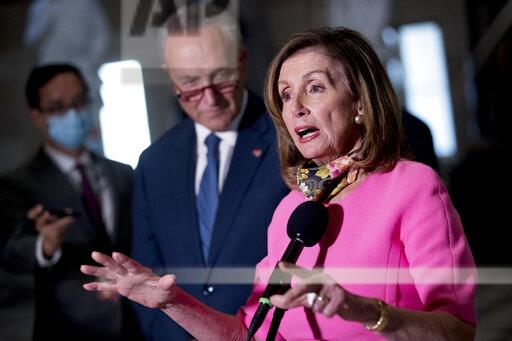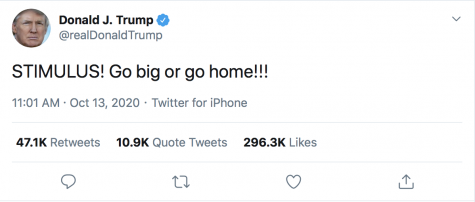Democrats and Republicans Face Off Over COVID-19 Stimulus Package

House Speaker Nancy Pelosi of Calif., center, accompanied by Senate Minority Leader Sen. Chuck Schumer of N.Y., left, speak to reporters following a meeting with Treasury Secretary Steven Mnuchin and White House Chief of Staff Mark Meadows as they continue to negotiate a coronavirus relief package on Capitol Hill in Washington, Friday, Aug. 7, 2020. (AP Photo/Andrew Harnik)
Oct 21, 2020
Back in March, the federal government passed the Coronavirus Aid, Relief and Economic Security Act, usually called the CARES Act. This package provided aid to state and local governments fighting the pandemic and also to unemployment benefits, small businesses and individuals.
Following the expiration of the CARES Act back in July, House Democrats, Senate Republicans and the White House have struggled to find the right footing for another relief package. In recent developments, the White House, led by Treasury Secretary Steven Mnuchin, has gotten closer to an agreement with House Democrats, under House Speaker Nancy Pelosi’s watch. In the Senate, however, Republicans seem to want a smaller sized package in comparison to the nearly $2 trillion the White House has offered.
Since the onset of the pandemic, the economy has bounced back rapidly, but it’s slowing down. At the end of March, weekly initial unemployment claims reached over 6.8 million. These claims have leveled off at between 800,000 and 900,000 for the last several weeks.
Federal Reserve Chairman Jerome Powell has warned that the federal government needs to act fast to energize the sluggish economic indications. Powell believes that the negative ramifications of spending too little would prove to be dire in comparison to spending too much.
At the beginning of this month, President Donald Trump tweeted that he and his team were done with stimulus talks until after the election. Not long after, following stock market losses, Trump quickly reversed course tweeting: “STIMULUS! [sic] Go big or go home!!!”

The House Democrats have their stimulus package set at $2.2 trillion as opposed to the White House’s $1.88 trillion. Several House Democrats, concerned about struggling constituents, have clamored for Pelosi to reach an agreement sooner rather than later. In an interview with CNN’s Wolf Blitzer, Blitzer stated that the speaker should not “let the perfect be the enemy of the good” to which she replied, “It is nowhere near perfect.”
At Trump’s NBC town hall on Oct. 15, he indicated that he would be willing to go even bigger than the White House’s proposed $1.88 trillion.
Some Senate Republicans do not wish to spend another dime on stimulus while others do not seek to spend anything more than $1 trillion. At the forefront of GOP worries lies a looming national debt that would create greater interest payments, causing lethargic economic gains in the long run.
After speaking with Treasury Secretary Steven Mnuchin Saturday evening, Pelosi imposed a 48-hour ultimatum on talks.
It is unclear whether the deadline is being used as a negotiating tactic or will result in the conclusion of any relief packages making their way to the American people before Election Day.












